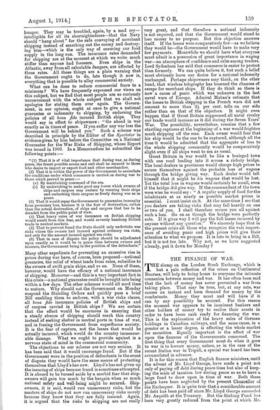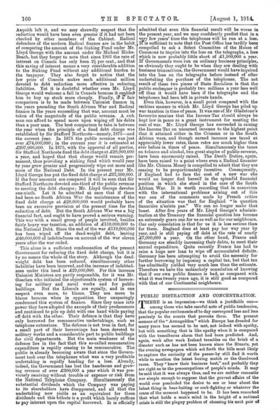THE FINANCE OF WAR. T HE slump on the London Stock
Exchange, which is but a pale reflection of the crises on Continental Bourses, will help to bring home to everyone the intimate connexion between money and war. It has often been said that the lack of money has never prevented a war from taking place. That may be true, but, at any rate, war causes an instant and keen demand for money by the combatants. Money they must and will have if it can by any possibility be secured. For this reason the moment war appears to be imminent bankers and other holders of money try to realize their assets in order to have loose cash ready for financing the war. This is the explanation of the heavy sales of German holdings in Canadian railways, and the same cause, in a greater or a lesser degree, is affecting the whole market for securities. Equally important is the effect of war upon the finances of the Governments concerned. The first thing that every Government must do when it goes to war is to borrow money, unless, as in the case of the recent Italian war in Tripoli, a special war hoard has been accumulated in advance.
It is for this reason that English finance ministers, until the advent of Mr. Lloyd George, have made a point not only of paying off debt during peace time but also of keep- ing the scale of taxation low during peace so as to have a large fund to draw upon in time of war. Both these points have been neglected by the present Chancellor of the Exchequer. It is quite true that a considerable amount of debt has been paid off since Mr. Lloyd George succeeded Mr. Asquith at the Treasury. But the Sinking Fund has been very greatly reduced from the point at which Mr. Asquith left it, and we may shrewdly suspect that the reduction would have been even greater if it had not been checked by other members of the Cabinet. Radical defenders of the modern Radical finance are in the habit, of comparing the amount of the Sinking Fund under Mr.
Lloyd George with the amount under Sir Michael Hicks- Beach, but they forget to note that since 1903 the rate of interest on Consols has only been 212 per cent., and that this saving of interest means a very considerable addition to the Sinking Fund without any additional burden to the taxpayer. They also forget to notice that the low price of Consols makes each additional million devoted to debt reduction more effective in reducing, liabilities. Yet it is doubtful whether even Mr. Lloyd George would welcome a fall in Consols because it enabled' him to buy up stock more cheaply. Finally, LT fair comparison is to be made between Unionist finance in, the years preceding the South African War and Radical finance in the years succeeding that war, account must be taken of the magnitude of the public revenue. A rich man can afford to spend more upon wiping off his debts than a poor man. The best comparison to take is between the year when the principle of a fixed debt charge was established by Sir Stafford Northcote—namely, 1875—and the current year. In 1875 the public revenue was just over £74,000,000 ; in the current year it is estimated at £207,000,000. In 1875, with the approval of all parties, Sir Stafford Northcote fixed the debt charge at £28,000,000 a year, and hoped that that charge would remain per- manent, thus providing a sinking fund which would year by year grow greater and progressively wipe out more and more of the National Debt. In the present year Mr. Lloyd George has put the fixed debt charge at £23,500,000. If the four amounts are compared it will be seen that Sir Stafford Northcote devoted one-third of the public revenue to meeting the debt charges ; Mr. Lloyd George devotes one-ninth. Let it be admitted at once that if there had been no South African War the maintenance of the fixed debt charge at £28,000,000 would probably have been an excessive provision at the present time for the reduction of debt. But the South African War was a big financial fact, and ought to have proved a serious warning. This war with a small group of people involved, besides fairly heavy war taxation, an addition of £159,000,000 to the National Debt. Since the end of the war £119,000,000 has been wiped off the dead-weight debt, • leaving £40,000,000 of indebtedness on account of the war eleven years after the war ended.
This alone is a sufficient condemnation of the present Government for reducing the fixed debt charge, but it is by no means the whole of the story. Although the dead- weight debt has been reduced, simultaneously other liabilities have been incurred, and the increase of indebted- ness under this head is £29,000,000. For this increase Unionist Ministers are partly responsible, for it was Mr. Goschen who initiated the objectionable system of borrow- ing for military and naval works and for public buildings. But the Liberals are equally, and in one respect even more, to blame. They are more to blame because when in opposition they unsparingly condemned this system of finance. Since they came into power they have adopted the example of their predecessors and continued to pile up debt with one hand while paying off debt with the other. Their defence is that they have only borrowed for remunerative undertakings, such as telephone extensions. The defence is not true in fact, for a small part of their borrowings has been devoted to military works and a considerable part to public buildings for civil departments. But the main weakness of the defence lies in the fact that this so-called remunerative expenditure is rapidly ceasing to be remunerative. The public is already becoming aware that since the Govern- ment took over the telephones what was a very profitable undertaking is rapidly beading for a loss. Already, indeed, the Government has lost the handsome and grow- ing revenue of over £300,000 a year which it was pre- viously receiving without trouble or expense or risk from the National Telephone Company. Simultaneously the substantial dividends which the Company was paying to its shareholders have disappeared, and all that the undertaking now yields as an equivalent for these dividends and this tribute is a profit which barely suffices to pay interest upon the capital borrowed. It is officially admitted that even this financial result will be worse in the present year, and we may confidently predict that in a, veryfew years' time the telephones will be run at a loss. Iris sufficient to note that the Post Office has tardily been compelled to ask a Select Committee of the House of Commons to inquire into the loss on the telegraphs, a loss which is now probably little short of £1,500,000 a year. It Governments were run on ordinary business principles, as obviously they ought to be when they are dealing with business transactions, the Government would have inquired into the loss on the telegraphs before instead of after undertaking the purchase of the telephones. The net result of these two pieces of State Socialism is that the public exchequer is probably two millions a year less well off than it would have been if the telegraphs and the telephones had been left in private hands.
Even this, however, is a small point compared with the reckless manner in which Mr. Lloyd George has piled up war taxation in time of peace. It was one of Mr Gladstone's favourite maxims that the Income Tax should always be kept low in peace as a great instrument for meeting the cost of war. Mr. Lloyd George has succeeded in raising the Income Tax on unearned incomes to the highest point that it attained either in the Crimean or in the South African wars, and though earned incomes are taxed at appreciably lower rates, those rates are much higher than ever before in times of peace. Simultaneously the taxes on tobacco and alcohol, two great staples of public revenue, have been enormously raised. The Death Duties, again, have been raised to a point where even a Radical financier like Mr. Chiozza Money is compelled to admit that they are ceasing to be proportionately lucrative. Consequently, if England had to face the cost of a new war she would no longer find herself in the splendid financial position in which she stood in the case of the South African War. It is worth recording that in connexion with the international problems arising out of this war one of the comments made by French critics of the situation was that for England " la question financiere n'existe pas." We can no longer make that boast. After five years of Mr. Lloyd George's adminis- tration at the Treasury the financial question has become an extremely grave one for us as well as for our neighbours. Our only consolation is that for us it is less serious than for them. England does at least pay her way year by year, and is still paying off debt at the rate of nearly £7,000,000 a year. On the other hand, France and Germany are steadily increasing their debts, to meet their annual expenditure. Quite recently France has had to raise a huge new loan to wipe off accumulated deficits. Germany has been attempting to avoid the necessity for further borrowing by imposing a capital tax, but that tax has admittedly yielded very much less than the estimate. Therefore we have the melancholy consolation of knowing that if our own public finance is bad, as compared with what it was twenty years ago, it is still good as compared with that of our Continental neighbours.



































 Previous page
Previous page